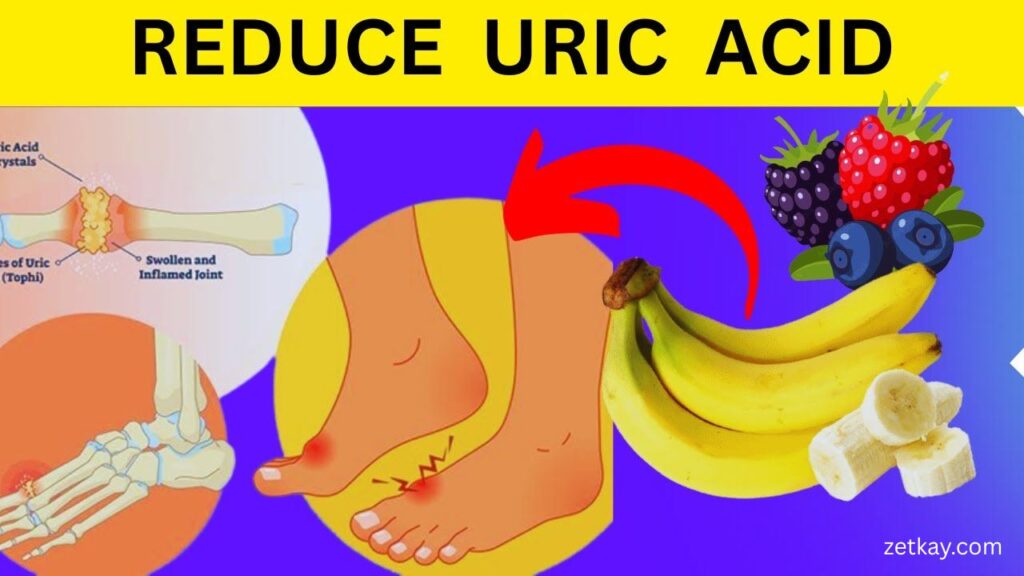Learn how to reduce uric acid naturally with home remedies, diet tips, and lifestyle changes. Discover foods to avoid, symptoms of high uric acid, and effective treatments.
Uric acid is a natural chemical created when the body breaks down purines, substances found in many foods and even inside our cells. Usually, uric acid dissolves in the blood, travels to the kidneys, and leaves the body through urine. However, levels rise when the body produces too much uric acid or the kidneys fail to remove it properly. This condition is called hyperuricemia, and it can cause serious health problems like gout, kidney stones, joint pain, and swelling.
If you are struggling with high uric acid levels, don’t worry there are effective ways to control and reduce them. This article explains everything you need to know about the causes, symptoms, natural remedies, medical treatments, and diet tips to manage uric acid.
What is Uric Acid?
Uric acid is a waste product of purine metabolism. Purines are natural compounds in foods like red meat, seafood, beans, and certain vegetables. Your body also produces purines during cell breakdown. Usually, uric acid is harmless in small amounts. But when levels rise above normal, crystals form in the joints and kidneys, leading to painful conditions.
The normal uric acid level in the blood is:
- Men: 3.4 – 7.0 mg/dL
- Women: 2.4 – 6.0 mg/dL
Anything above this range may increase the risk of health issues.

Causes of High Uric Acid Levels
High uric acid can happen for different reasons, often a mix of diet, lifestyle, and medical conditions. Some significant causes include:
Eating purine-rich foods like red meat, organ meats (liver, kidney), shellfish, and anchovies.
Excessive alcohol consumption, especially beer and liquor.
Sugary drinks containing high-fructose corn syrup increase uric acid production.
Obesity stresses the kidneys and reduces their ability to filter uric acid.
Chronic health problems such as diabetes, high blood pressure, and kidney disease.
Genetics, since a family history of gout or kidney problems increases the risk.
Certain medications, such as diuretics, can raise uric acid levels.
Understanding the cause helps you make the right lifestyle changes.
Symptoms of High Uric Acid
High uric acid may not always show symptoms at first. Many people only find out after a blood test. But as levels rise, symptoms become clearer:
- Joint pain and swelling, especially in the big toe, ankle, or knee (classic sign of gout).
- Redness and warmth in joints during uric acid flare-ups.
- Stiffness that makes it difficult to move joints.
- Kidney stones cause back pain, nausea, and painful urination.
- Fatigue and weakness, especially during gout attacks.
Ignoring these signs may lead to serious complications, so early action is crucial.
Natural Ways to Reduce Uric Acid
1. Drink Plenty of Water
Water is the most straightforward natural remedy. Drinking 8–10 glasses daily helps the kidneys flush out uric acid efficiently. Dehydration allows uric acid crystals to build up, leading to pain and kidney stones. Adding lemon to water can provide extra alkaline benefits.
2. Avoid High-Purine Foods
Purine-rich foods break down into uric acids. To control levels, avoid or limit:
- Red meat (beef, lamb, goat)
- Organ meats (liver, kidney, brain)
- Shellfish and sardines
- Beer and alcohol
Instead, choose low-purine foods like fruits, vegetables, whole grains, and dairy.
3. Eat More Low-Fat Dairy Products
Low-fat milk, yogurt, and cheese help lower uric acids levels. They contain proteins that may help the body remove uric acids. People who regularly consume dairy have fewer gout attacks than those who don’t.
4. Add Vitamin C-Rich Foods
Vitamin C improves uric acids excretion through urine. Eating fruits like oranges, kiwi, papaya, strawberries, and bell peppers helps lower uric acids naturally. Some doctors also recommend Vitamin C supplements.
5. Maintain a Healthy Weight
Being overweight increases uric acids production and reduces kidney function. Losing weight through a balanced diet and light exercise can dramatically improve uric acids levels. Crash dieting should be avoided, as it may temporarily increase uric acids.
6. Avoid Sugary Drinks and Alcohol
Sodas, packaged juices, and alcohol (especially beer) increase uric acids production. Alcohol prevents the kidneys from removing uric acids, while fructose in sugary drinks creates more uric acids during digestion. Replace them with water, coconut water, and herbal teas.
7. Include Cherries and Berries
Studies show that cherries, blueberries, and strawberries contain antioxidants and anti-inflammatory compounds that help reduce uric acids and prevent gout attacks. Having a small bowl daily may help.
8. Exercise Regularly
Daily exercise improves metabolism and kidney function. Walking, yoga, stretching, and swimming are excellent choices. However, avoid over-exercising during a gout attack, as it may worsen the pain.
Medical Treatment for High Uric Acids
Sometimes, lifestyle changes alone are not enough. Doctors may prescribe medicines such as:
- Allopurinol – reduces uric acids production.
- Febuxostat – controls uric acids levels in chronic cases.
- Colchicine and NSAIDs – reduce inflammation and pain during gout attacks.
Always consult a doctor before taking any medication.
Diet Plan for Reducing Uric Acids
Here’s a simple sample diet plan to follow:
- Breakfast: Oatmeal with strawberries, low-fat milk, and green tea.
- Lunch: Brown rice, steamed vegetables, grilled chicken or fish (moderate), and salad.
- Snacks: Fresh fruits like apples, pears, or cherries.
- Dinner: Vegetable soup, whole wheat bread, and yogurt.
- Drinks: Water, lemon water, coconut water, or herbal tea throughout the day.
This plan includes low-purine foods and keeps the body hydrated, helping to reduce uric acids.
Conclusion
High uric acids is a growing health concern, but the good news is that it can be controlled with proper care. You can successfully lower your uric acids levels by drinking more water, avoiding purine-rich foods, including Vitamin C and dairy, and maintaining a healthy lifestyle. In severe cases, medical treatment is necessary to prevent complications like gout or kidney stones.
Early action and consistent habits are the keys to long-term uric acids control.
FAQs on Reducing Uric Acids
1. What are the normal uric acids levels in adults?
For men, 3.4–7.0 mg/dL, and for women, 2.4–6.0 mg/dL is considered normal.
2. Can uric acids be cured permanently?
Uric acids cannot be “cured,” but it can be controlled with diet, lifestyle, and medication.
3. Is a banana good for uric acids?
Yes, bananas are low in purines and high in fiber, making them suitable for uric acids control.
4. Can exercise reduce uric acids?
Regular exercise helps reduce uric acids, but avoid heavy exercise during gout attacks.
5. Which drink is best for uric acids?
Water, lemon, and coconut water are the best drinks to flush out uric acids.
